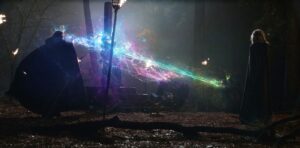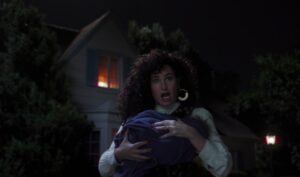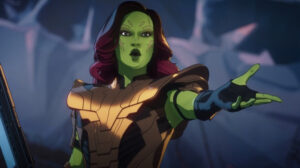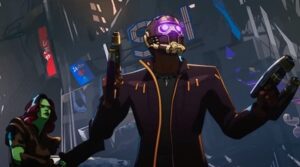SPOILERS FOR ETERNALS AHEAD!
Eternals may not be the sure-fire Best Picture nominee that Marvel Studios thought they had on their hands when they debuted it at the Rome Film Festival to a lukewarm and increasingly negative critical reception, but in the long run, fans of the film needn’t fear that the Eternals will be ret-conned out of the Marvel Cinematic Universe or that their storylines will be abandoned going forward. The box-office has been strong enough to ensure that heroes like Sersi and Thena and the newly-knighted Dane Whitman will return somewhere down the line, in various other MCU projects if not in their own sequel.
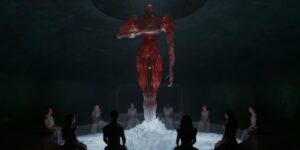
If you ask me, the instantly endearing characters of Eternals are easily the film’s greatest strength. I’m sure Marvel has their secretive reasons for wanting to get us acquainted with the complex (and somewhat convoluted) lore of the Celestials and Deviants and the origins of the universe itself, all of which will be revealed in due time, but it’s these characters who make continuing this story worthwhile right now. Director Chloé Zhao infused almost all of the ten earthly Eternals with vibrant humanity, and they each have seven-thousand years of individual stories to explore in prequels and spin-offs even before we look to their collective future.
So in today’s post, we’ll be looking at where the Eternals will be headed next in the MCU, both separately and as a team unit. There’s a spoiler warning at the top of the page, but in case you missed it, I’ll be discussing the film’s shocking ending, mid-credits scene, and a number of other plot-points including character deaths. You’ve been warned.
Now, speaking of character deaths, let’s start there – because by the end of Eternals, there at least two characters whose arcs conclusively end in their deaths, and a third whose death is satisfying and oh-so-poetic, but who might be too good a character to waste this early. Salma Hayek’s Ajak and Don Lee’s Gilgamesh fall into the former category, and Richard Madden’s Ikaris is of course the latter.
Ajak is the first Eternal to die, surprisingly early in the film, and her teammates happen upon her lifeless body outside her home in South Dakota without being given a chance to properly say their goodbyes to the caring yet deeply flawed woman who led the Eternals for seven-thousand years. We’re initially led to believe that Ajak was killed by a Deviant who absorbed her regenerative powers, but it’s revealed in the third act that there was a little more to it than that. Ajak was sacrificed to the Deviants by her own right-hand man, Ikaris, after he discovered that Ajak didn’t want to complete the Eternals’ top-secret mission to destroy the earth.
As I explained in my review of the film, Ajak’s entire character arc is scattered over just a couple of out-of-order scenes, so it’s hard to initially feel much grief for a person who until the third act is largely depicted as turning a blind eye to various tragedies, including the genocide of indigenous Mesoamericans in Salma Hayek’s home country of Mexico. But when we learn how she used her last few years to evolve and find the good in humanity just before Ikaris brutally executes her, well, it doesn’t make up for any of her wrongdoings, but it perfectly illustrates how the Eternals’ centuries of inaction caused all their problems and how they nearly were too late to change. So I think Ajak’s death is fitting.
Gilgamesh’s death also comes at just the right moment in the story, although I’d be less opposed to some fantastical resurrection plot device being used to engineer his return in the future. He and Angelina Jolie’s Thena are platonic soulmates for thousands of years, and their relationship only grows deeper when Ajak diagnoses Thena with Mahd Wy’ry, which she misleadingly describes as a buildup of memories in the brain over centuries that can cause an Eternal to become mentally unstable and violent. Gilgamesh brings Thena to Australia, where they settle down in the desert and live quietly for the next few centuries, with Gilgamesh caring for his friend and giving her love and support.
With Sersi’s help, Thena discovers that everything she thought she knew about Mahd Wy’ry was a lie. Long story short, her visions, panic attacks, and aggressive outbursts are actually a result of her glimpsing into the memories of other Eternals on other planets across the universe – or rather, former planets. Thena and Gilgamesh join the Eternals’ quest to stop the destruction of earth, but sadly Gilgamesh dies not long thereafter, killed by the same Deviant that took Ajak’s life. He and Thena share one last moment together, one which actually drew tears from my eyes, as he pleads with her to remember. The fact that even as he’s dying he wants her to remember her life and not specifically him is heartbreaking and hard-hitting.
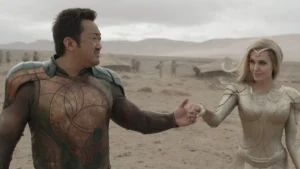
Then there’s Ikaris. The second highest-ranking member of the Eternals and the only one besides Ajak who knows their true purpose on earth, Richard Madden’s Ikaris is defined both by his unwavering loyalty to the mission and by his age-long love for his teammate, Sersi. It’s unfortunate that their romance is almost entirely devoid of chemistry, because it had the potential to be truly epic. Sersi loves the earth and its inhabitants from the moment she first looks upon it, but Ikaris has only ever pretended to love humans so he can get closer to Sersi and try to relate to her. They find themselves on opposite sides in the film’s third act, with Sersi fighting to save earth and Ikaris to destroy it.
But when they confront each other face-to-face in the film’s most dramatic moment, Ikaris has a change of heart – not because he realizes for himself that humanity is worth saving or that he’s loved earth all along and didn’t want to admit it, but because he finally understands what earth and its people mean to Sersi. And in the end, his love for her outweighs his devotion to the mission and his belief in the Celestial plan for the Eternals. Ikaris stops fighting, leaves earth, and looks back at it one last time – mirroring his and Sersi’s first scene in the film, where he only had eyes for Sersi while she was the one staring down at earth – before flying into the sun.
This bleak and beautiful death is obviously intended to evoke the myth of Ikaris’ namesake in Greek mythology, Icarus; a boy with wings who flew too close to the sun in a moment of reckless pride and burned up. But the parallels to ancient mythology go deeper than that surface-level reading: mythology is uniquely full of stories of tragic couples in which one or both lovers will die by their own hand, usually after some misunderstanding and horrific moment of revelation. It’s a story structure that’s not quite as popular nowadays, and to see it used in a Marvel film is actually extraordinary. But another common theme in mythology, particularly Greek mythology, is that of the hero’s descent into the underworld to retrieve the soul of a lost loved one.
Could we see Sersi or another Eternal attempt to resurrect Ikaris? It’s not as implausible as it sounds. Halfway through Eternals, it’s explained to Sersi in one of the film’s several exposition-heavy monologues that the Eternals were forged, not born (an interesting and perhaps deliberate parallel to Agatha Harkness’ description of Wanda Maximoff), and that all of their memories from before arriving on earth were implanted into their heads by their true maker, the Celestial Arishem. He keeps these memories stored away in a chamber of the World-Forge, which is where he designs, builds, and breathes life into his Eternals.
So there is a path for Ikaris to come back, or more likely for his memories to be transplanted into the body of a new Eternal (i.e. a different actor). And Arishem himself might have already arranged for that to happen. At the end of the film, the Celestial arrives on Earth and summons Sersi, Phastos, and Kingo to join him in deep space, presumably at the World-Forge judging by Arishem’s remark that he will look through their memories to determine if they and the planet they love so much are actually worth saving. I can’t wait for Chloé Zhao to get the chance to explore that location in more depth and detail, but most importantly it will give our characters a chance to find Ikaris’ memories.
And something else Arishem doesn’t realize is that Sersi, Phastos, and Kingo aren’t the only Eternals left from the team he sent to Earth. Shortly before Arishem’s arrival, Thena departed the planet along with the speedster Makkari and telepath Druig on a mission to find other Eternals scattered across the universe and try to persuade them to save the planets which they’ve been assigned to destroy. The mid-credits scene picks up with this trio sometime later, arguing about whether they should head back to Earth to find out why their friends aren’t responding to their messages or continue their objective.
That’s when they’re rudely interrupted by the arrival of not one but two characters new to the MCU. Patton Oswalt voices Pip the Troll, an obscure Marvel Comics antihero who’s usually paired up with Guardians Of The Galaxy characters like Adam Warlock, Gamora, and Yondu Udonta’s Ravagers. In the MCU, he serves a different role as the herald and traveling companion of a maverick Eternal, Eros. Pop-star and Dunkirk actor Harry Styles portrays Eros, a stunning casting choice that was unfortunately ruined for general audiences long before the film’s release by a professional critic.

Eros is a fascinating addition to the MCU, for several reasons. Sure, he’s the younger brother of Thanos and it’ll be interesting to explore more of the history of their home-planet Titan and the branch of Eternals that lived there before they and everyone else were wiped out by famine and war. And yeah, he’s a part-time Avenger with strong connections to Mar-Vell and the Kree that could be depicted in The Marvels. But let’s be honest, that’s hardly the most noteworthy thing about a character who, just like his Greek mythological counterpart, can manipulate the brain’s pleasure centers in a number of ways.
This bizarre power comes with greater responsibility than most, and I don’t expect Marvel to utilize it to the same degree as in the comics – not unless they’re prepared to adapt all the stories in which Eros is accused of sexual assault, and even stands trial at one point with She-Hulk acting as his lawyer. I mean, they could do that, and it would allow them to explore some important real-world topics, but I’m wary of them handling those topics well. And honestly, I think Harry Styles’ Eros would make a much better superhero intimacy coach than sexual offender. If the dispassionate sex scene in Eternals is any indicator, the MCU could use a lesson or two from the god of love.
That being said, Eros is probably as morally ambiguous as any of the Eternals, and I won’t be surprised if he uses his powers recklessly at first – perhaps playing matchmaker with Sersi and a resurrected version of Ikaris. If he runs into the Guardians of the Galaxy anytime soon, I could easily envision a scenario where Eros gets entangled in Peter Quill’s awkward relationship with the time-displaced Variant of Gamora who doesn’t love Quill the way Quill loves the deceased version of her from the main MCU timeline, using his powers with disastrous effects. Basically, just don’t romanticize the removal of consent, and things should work out.
Back on Earth, there’s one last wild-card to consider. Lia McHugh’s Sprite, an Eternal trapped in the body of a child, made the difficult choice to become a human so that she can finally grow up and live a normal life – with the chance to experience love being one of her primary motivations for giving up her illusion-casting powers. Arishem didn’t take Sprite with him to the World-Forge, but it’s hard to believe that she’ll be completely absent from the story going forward. She could help Sersi’s distraught boyfriend back on Earth, Dane Whitman, as he musters the courage to embrace his destiny as the Black Knight and take on the Celestial host.
I don’t expect we’ll see the full team reassembled for a long time, perhaps not ever seeing as Ajak and Gilgamesh are probably really dead and Ikaris might not come back in the same form. But we now know there are hundreds of thousands of Eternals scattered across the universe, including several important characters from the comics who didn’t make it into this film. I suspect we’ll even meet a few in Thor: Love And Thunder, if Gorr the God-Butcher considers Eternals godly enough to make worthwhile targets for his Necroblade. And the distinctions between Eternals and Greek gods are already blurry enough that Hercules could easily be another member of their species.
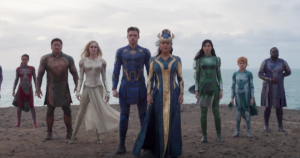
As long as Makkari, Thena, Kingo, Druig, and Phastos stay on the team, I wouldn’t object if others come and go. Sersi could make her way onto the Avengers team just as she did in the comics. Druig has a comics history of villainy and connections to the Soviet Union that haven’t really been touched upon (I’m still waiting for the reveal that he’s Natasha Romanoff’s biological father). And Kingo is delightfully off in his own world most of the time, so give him a Bollywood spin-off with lots of over-the-top musical numbers, and I’ll be more than happy.
So where do you hope to see the Eternals pop up next, and which character are you most excited to follow throughout Phase 4? Share your own thoughts, theories, and opinions, in the comments below!




